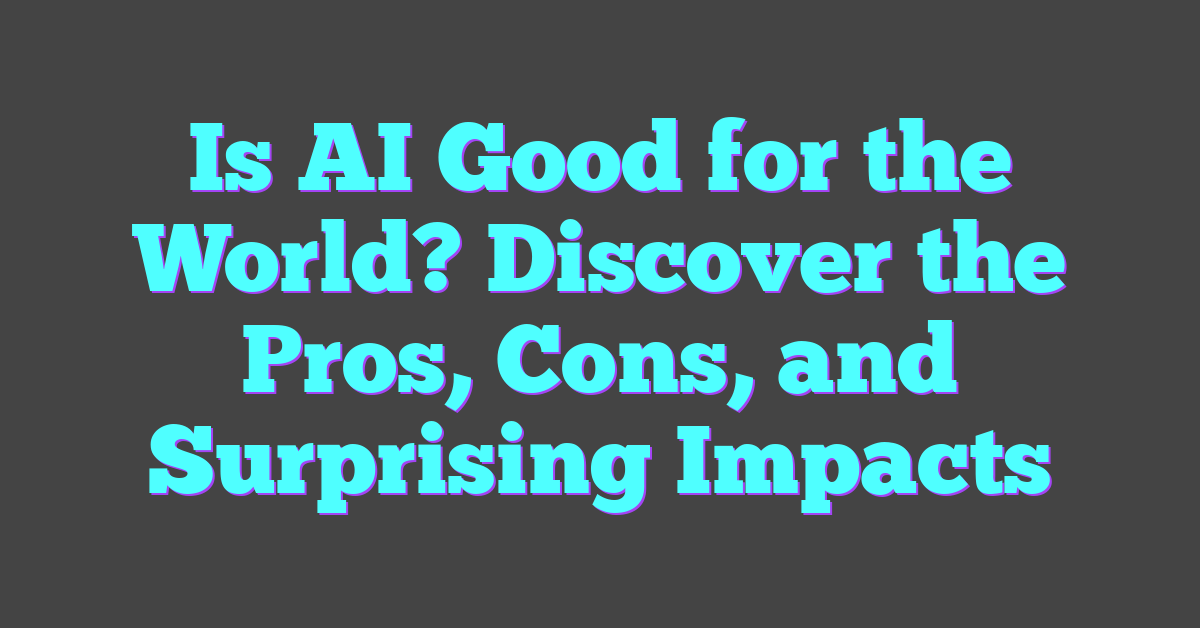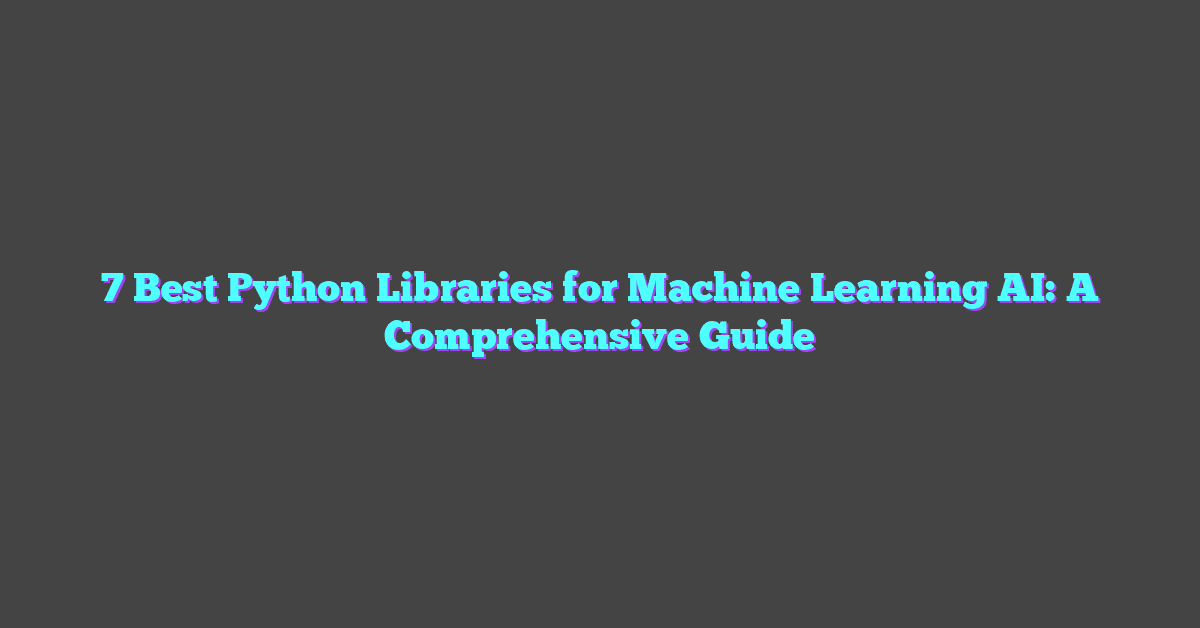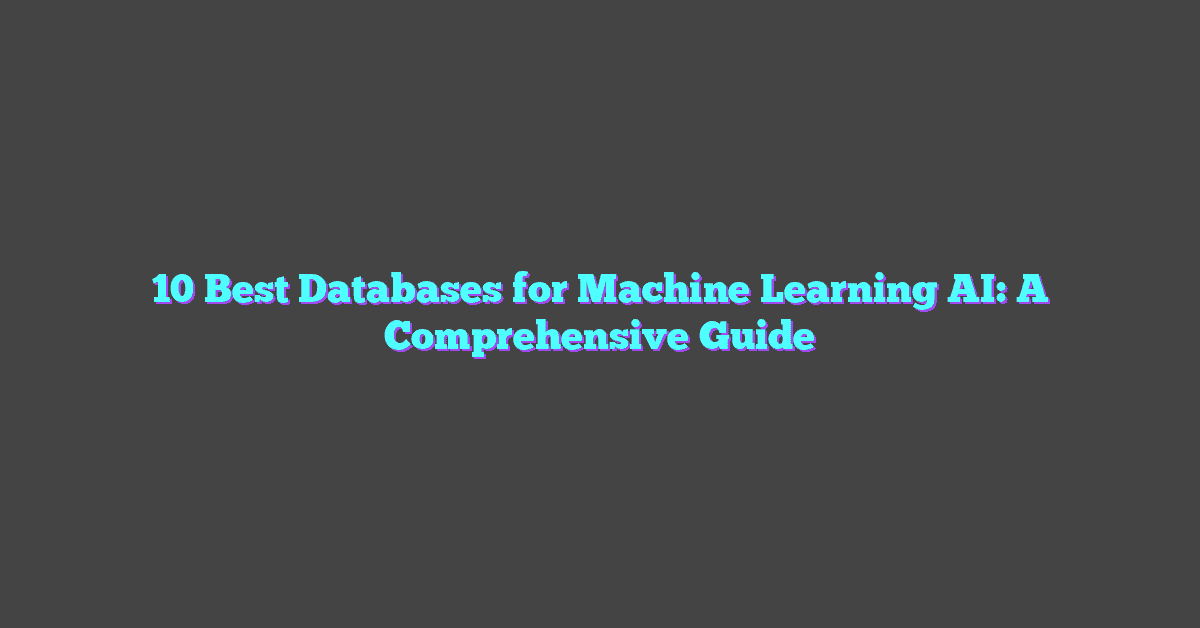Artificial Intelligence (AI) is no longer just a concept from science fiction; it’s now a part of our everyday lives. From virtual assistants like Siri and Alexa to more complex systems driving advancements in healthcare and finance, AI’s impact is undeniable. But with great power comes great responsibility, and it’s natural to wonder if AI is truly good for the world.
While AI promises to revolutionize industries and improve quality of life, it also raises concerns about job displacement, privacy, and ethical dilemmas. The debate isn’t just about the technology itself but how we choose to use it. So, is AI a force for good, or does it pose risks that outweigh its benefits? Let’s dive into the multifaceted world of AI to explore its potential and pitfalls.
Exploring the Impact of AI on Society
Artificial Intelligence (AI) continues to revolutionize society, impacting various sectors and enhancing daily life.

Benefits of AI on Healthcare
AI transforms healthcare by enabling early disease detection and personalized treatment plans. Algorithms analyze medical images to identify conditions like cancer with remarkable accuracy. Machine learning models predict patient outcomes, allowing doctors to tailor interventions. Natural language processing helps in sifting through vast medical records to find relevant patient information swiftly. Robo-surgeons, guided by AI, are performing complex surgeries with precision, reducing recovery times. Virtual health assistants provide 24/7 support to patients, answering queries and monitoring vital signs.
AI in Education: Enhancing Learning
AI enhances educational experiences by providing personalized learning paths for students. Adaptive learning platforms assess student performance, identifying strengths and weaknesses, and curating tailored educational content. AI-driven chatbots offer students instant feedback on assignments and answer academic questions round-the-clock. Predictive analytics help educators identify students at risk of falling behind, enabling timely interventions. Automated grading systems reduce the workload on teachers, allowing them to focus on instruction and mentorship. Virtual tutors, powered by AI, offer supplementary instruction in subjects where students need additional help, ensuring no one falls through the cracks.
Economic Implications of Artificial Intelligence
Artificial Intelligence (AI) has profound economic implications. It impacts job markets, industries, and the global economy in interconnected ways.
AI in Job Creation and Automation
AI’s role in job creation and automation is complex. On one hand, automation driven by AI can lead to job displacement. For example, traditional roles in manufacturing and customer service often get replaced by robotics and chatbots. A 2019 report by the Brookings Institution noted that 25% of US jobs face high exposure to automation.
On the other hand, AI also has the potential to create new jobs. Emerging roles in data science, machine learning, and AI ethics have gained prominence. According to the World Economic Forum, AI could create 97 million new jobs by 2025. Furthermore, job categories in AI-related fields typically offer higher wages than many traditional roles.
Impact on Global Economy
AI influences the global economy by enhancing productivity, driving innovation, and creating new markets. McKinsey Global Institute estimates that AI could contribute $13 trillion to the global economy by 2030. AI boosts productivity across sectors like retail, healthcare, finance, and logistics by automating routine tasks and providing insightful analytics.
Certain regions are investing heavily in AI technologies. For example, China has set a goal to become a global AI leader by 2030. The United States continuously pours significant resources into AI research and development. These investments drive competitive advantages and stimulate economic growth.
In developing countries, AI offers opportunities to leapfrog traditional development stages. For instance, in agriculture, AI-based precision farming methods can increase crop yields and reduce resource consumption, leading to more stable food supplies and improved economies.
AI’s economic implications extend far and wide, marking a transformative shift in how global economies function and evolve.
Ethical and Privacy Concerns of AI
Artificial Intelligence offers countless benefits. However, ethical and privacy concerns warrant detailed attention.
Surveillance and Privacy
Massive data collection powers AI systems. Companies and governments often collect this data, sometimes without explicit consent. This practice raises significant privacy issues. For example, China uses AI for mass surveillance, monitoring citizens’ activities. Such applications pose risks to individual freedoms, making robust data protection laws essential. Transparency in how data is used can help maintain public trust.
Bias and Discrimination in AI Systems
AI algorithms can perpetuate and amplify biases. These biases often stem from training data that reflects historical inequalities. In hiring processes, for instance, AI systems trained on biased data can favor certain demographics. Research from MIT Media Lab found that facial recognition systems have higher error rates for darker-skinned individuals and women. Addressing these issues involves using diverse datasets and implementing rigorous bias detection methods. Creating ethical AI calls for continuous scrutiny and improvement.
Environmental Impact of AI Technologies
Artificial Intelligence (AI) technologies are reshaping various sectors, including the environment. Their influence on sustainability issues, energy consumption, and resource management is increasingly significant.
AI’s Role in Sustainability
AI technologies are enhancing various sustainability initiatives. Predictive analytics in AI models are optimizing renewable energy sources, such as wind and solar power, by forecasting energy production and aligning it with demand patterns. For instance, Google’s DeepMind has improved the efficiency of wind farms by predicting wind patterns 36 hours in advance, increasing energy yield by 20%. Furthermore, AI-driven smart grids manage energy distribution efficiently, reducing waste and minimizing carbon footprints.
AI algorithms also monitor and reduce emissions. Algorithms track air quality in real-time, identifying pollution hotspots and suggesting mitigation strategies. For example, IBM’s Green Horizon project uses AI to forecast air pollution levels and recommend actionable insights for reducing emissions in urban areas.
In agriculture, AI enhances sustainability through precision farming. Drones and sensors equipped with AI analyze crop health, soil conditions, and moisture levels, ensuring optimal use of resources like water, fertilizers, and pesticides. This targeted approach minimizes waste and environmental impact while boosting crop yields.
Challenges and Solutions
AI technologies present several challenges in environmental contexts. One significant concern is the high energy consumption associated with training large AI models. Data centers powering AI require vast amounts of electricity, contributing to carbon emissions. According to a 2019 study by the University of Massachusetts, training a single AI model can emit as much carbon as five cars over their lifetimes.
Addressing these issues involves adopting energy-efficient algorithms and hardware. Researchers are developing AI optimizations that reduce computational requirements without compromising performance. Liquid cooling systems and renewable energy-powered data centers are becoming more prevalent, mitigating the environmental impact of AI operations.
Regulation also plays a role in curbing AI’s energy footprint. Governments and international organizations are setting standards and guidelines for energy efficiency in AI development and deployment. Policies encouraging investment in sustainable technologies ensure AI continues to benefit the environment without exacerbating climate change.
Future Directions
The future of AI in environmental sustainability looks promising. Innovations like AI-driven circular economy models aim to reduce waste by optimizing resource usage and recycling processes. For example, AI systems can automate the sorting of recyclable materials, enhancing recycling efficiency and reducing landfill usage.
Conclusion
AI undeniably holds immense potential to transform various aspects of our world, from healthcare and education to the economy and environment. It’s a powerful tool that, when used responsibly, can drive significant advancements and promote sustainability.
Balancing the benefits and addressing ethical concerns is crucial for ensuring AI’s positive impact. By fostering transparency, protecting privacy, and promoting diversity in AI development, society can harness its full potential.
As we navigate the challenges and opportunities AI presents, a collaborative approach involving governments, industries, and communities will be essential. This way, AI can truly become a force for good, driving progress and innovation for a better future.
Frequently Asked Questions
What are the main benefits of AI in healthcare and education?
AI enhances diagnostic accuracy, personalized treatment plans, and administrative efficiency in healthcare. In education, it offers personalized learning, automates administrative tasks, and provides data-driven insights to improve teaching methods.
How does AI impact the job market?
AI leads to job displacement due to automation but also creates new roles in data science, AI ethics, and related fields. It is both a disruptor and creator in the job market.
What are the economic implications of AI by 2030?
Projections suggest AI could add $13 trillion to the global economy by 2030, mainly by improving productivity and fostering innovation.
How do countries like China and the United States benefit from AI investments?
Heavy AI investments by China and the U.S. are driving economic growth, offering competitive advantages. These investments enhance tech infrastructure, innovation, and global market influence.
What opportunities does AI present for developing nations?
AI offers significant opportunities in sectors like agriculture, boosting efficiency, productivity, and economic growth. It helps in modernizing traditional practices and improving resource management.
What are the major ethical concerns related to AI?
Key ethical concerns include surveillance, privacy, bias, and discrimination in AI systems. Addressing these involves strict data protection laws, transparency, and diverse datasets.
How can the ethical deployment of AI be ensured?
Ensuring ethical AI deployment requires robust data protection laws, transparent data usage, diverse datasets for training, and continuous bias detection and mitigation efforts.
What is the environmental impact of AI technologies?
AI aids in sustainability by optimizing energy sources, managing emissions, and enhancing agricultural practices. However, training AI models can consume significant energy, posing environmental challenges.
What approaches are being developed to reduce AI’s energy consumption?
Approaches such as energy-efficient algorithms, liquid cooling systems, and renewable energy-powered data centers are being developed to minimize AI’s energy footprint.
How does AI contribute to sustainability initiatives?
AI optimizes renewable energy, efficiently manages energy distribution, monitors emissions, and enhances precision farming, all contributing to sustainability efforts.
What is the future outlook for AI in terms of environmental sustainability?
Innovations like AI-driven circular economy models promise to reduce waste and optimize resource usage, promoting long-term environmental sustainability.




